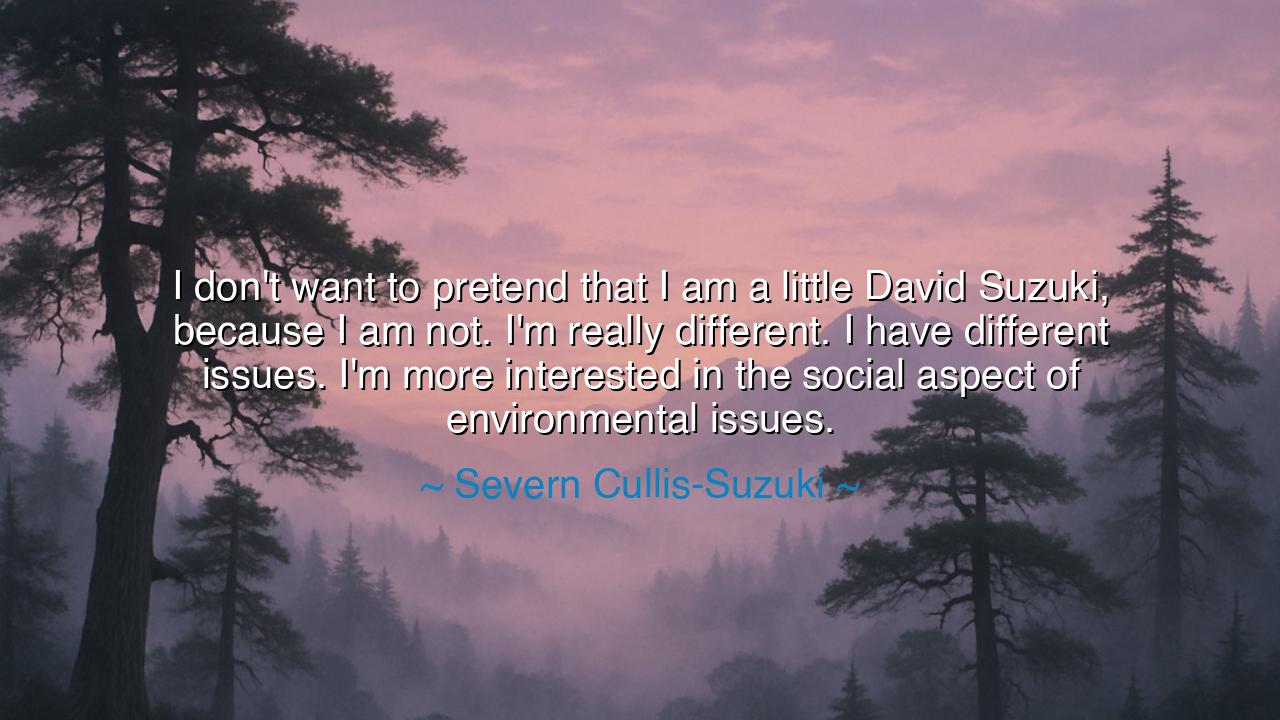
I don't want to pretend that I am a little David Suzuki, because
I don't want to pretend that I am a little David Suzuki, because I am not. I'm really different. I have different issues. I'm more interested in the social aspect of environmental issues.






Severn Cullis-Suzuki, daughter of the famed environmentalist David Suzuki, once spoke with humility and clarity: “I don’t want to pretend that I am a little David Suzuki, because I am not. I’m really different. I have different issues. I’m more interested in the social aspect of environmental issues.” These words may seem modest, but they carry the ancient truth of individuality—that each soul, though born from lineage and tradition, must walk its own path and find its own voice.
In acknowledging that she is not a “little David Suzuki,” Severn reveals a wisdom that many struggle to learn. Children of great figures often feel burdened by the weight of legacy, pressed to imitate rather than to create. Yet Severn refuses this burden. She honors her father, but she knows that to live authentically is not to be a shadow, but a flame of her own. This echoes the teaching of the ancients: that every disciple must one day cease to merely echo the master, and instead become a master in their own right.
Her chosen focus—the social aspect of environmental issues—is itself profound. Where her father often highlighted the science, the ecosystems, the raw data of the earth, Severn turns her gaze upon people, communities, and justice. She sees that the suffering of the planet is tied to the suffering of humanity, that pollution is not only chemical but social, that deforestation is linked to poverty, and that climate change strikes hardest at the poor and the voiceless. By choosing this path, she broadens the vision of environmentalism into something deeply human, a bridge between earth and society.
History bears witness to the power of such divergence. Consider the example of Socrates and Plato. The father spoke through questioning, tearing apart the illusions of the wise. The student, though honoring his teacher, built systems of philosophy that reached beyond, shaping politics, justice, and education. So too with Severn: she honors her father’s voice, but she dares to turn her own toward new issues, new audiences, and new dimensions of the struggle for balance between humanity and nature.
Her words also remind us of the courage required to be different. It is easy to follow a well-trodden path, to claim greatness by association. But Severn’s humility reveals her strength: she does not hide behind her father’s name, nor pretend to carry his mantle. She carves her own, even if it leads her into less certain ground. This is heroism of another kind—not conquest, but authenticity, not imitation, but originality.
What lesson, then, must we take from her words? It is this: do not fear to honor your heritage while also forging your own way. You may be born into a tradition, a family, or a legacy, but your calling will always be shaped by your unique passions and insights. If your elders fought for the forests, perhaps you must fight for the people who live within them. If your parents worked with science, perhaps you must work with community. Each contribution is part of the same tapestry, woven together across generations.
Therefore, let us follow Severn’s example. Let us see environmental issues not only as matters of science, but as matters of society, of justice, of equity. Begin by asking: who is most affected by the destruction of the earth? How do environmental choices shape the lives of the poor, the marginalized, the unseen? Then act—not only by planting trees or reducing waste, but also by lifting voices, building communities, and demanding fairness. For the earth is not healed by science alone, but by compassion joined with knowledge.
Thus, Severn Cullis-Suzuki’s words shine with a timeless teaching: you are not meant to be a “little” version of another. You are meant to be yourself, to serve where your heart is drawn, and to bring your own voice into the chorus of humanity. Honor the giants before you, but never lose your own step. For in daring to be different, you may uncover the very piece of wisdom the world most desperately needs.






AAdministratorAdministrator
Welcome, honored guests. Please leave a comment, we will respond soon